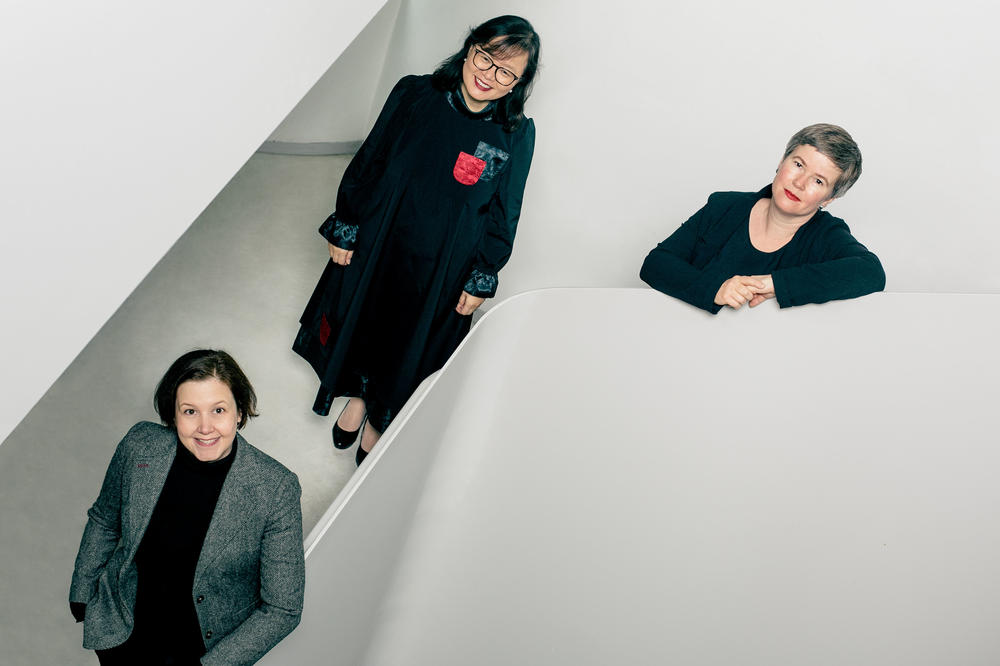Consolidating Knowledge about Contemporary Asia
Interview with the new board of the Graduate School of East Asian Studies / Next lecture in the GEAS Digital Lecture Series on February 25, 12:00: “Remembering the 3.11 triple disaster in Japan”
Feb 17, 2021
Professors Elena Meyer-Clement, Eun-Jeung Lee, and Cornelia Reiher (from left to right) form the new board of the Graduate School for East Asian Studies at Freie Universität Berlin.
Image Credit: Marcus Reichmann
They consolidate their Asia-specific expertise and form the new board of the Graduate School of East Asian Studies (GEAS): Professors Eun-Jeung Lee (Korean Studies), Elena Meyer-Clement (Chinese Studies), and Cornelia Reiher (Japanese Studies). In a recent interview in campus.leben, they explained why a platform like GEAS is important for interdisciplinary and international cooperation. They also discussed the current series of lectures on crisis management in East Asia and a new working paper series and explained the significance of research on East Asia, area studies, and the teaching of methodological tools.
Professor Lee, Professor Reiher, and Professor Meyer-Clement, what is the composition of the new board of the Graduate School of East Asian Studies?
Eun-Jeung Lee: Like the former board, it reflects East Asian Studies at Freie Universität: Cornelia Reiher represents Japanese studies, Elena Meyer-Clement Chinese studies, and I represent Korean studies.
We focus on Asian research in the social sciences, politics, and society and cooperate with other scholars at Freie Universität in the fields of history, cultural studies, political science, cultural and social anthropology, and business and economics.
We also work closely with colleagues from non-university research institutions such as the German Institute for International and Security Affairs (Stiftung Wissenschaft und Politik, SWP) as well as the other universities in Berlin to promote interdisciplinary collaboration.
Cornelia Reiher: t is particularly important to us to provide students who may have previously studied area studies in general with methodological tools of social science to be able to examine current global challenges in the context of East Asia. Methods training therefore plays a special role in our courses at GEAS. For example, we just published a methods manual for research on Japan that was based on experience gained at GEAS.
What role does GEAS play in German East Asian research?
Elena Meyer-Clement: Traditionally, the East Asian subjects at German universities are located in the field of non-European languages and cultures. Internationally, on the other hand, there has been an increasing trend since the 1950s to create Asian centers, where researchers working in different social science subjects on Asia come together. At Freie Universität, GEAS provides such a platform for bundling knowledge about contemporary Asia and to facilitate contact with our international partners.
One of your first projects as the new board was to organize a series of lectures dealing with crisis management in East Asia. Why was this your priority?
Meyer-Clement: We want to show how important the connection between social sciences and area studies is, especially for understanding East Asia.
By focusing on the region, different reactions to global challenges can be examined, for example, in the current pandemic. East Asia plays an important role in various aspects, on the one hand, because in some cases East Asian countries respond to the coronavirus crisis with different measures than European countries. On the other hand, our reactions say a lot about our society and relationship with East Asia.
Take, for example, the local media coverage in which Asian responses to the pandemic receive little attention or are likely to be presented as negative examples.
Reiher: Since the lecture series is designed as an online format, people can log in from all over the world. We have already had listeners from Asia and North America.
Professor Lee, what was the topic of the first lecture in the series, last November?
Lee: I talked about the response of East Asian countries to the pandemic, using South Korea as an example. In general, you can say that the response there was very rational, while in Germany emotional aspects played a role.
As an East Asian, I almost experienced a “pandemic Orientalism” in Germany. The virus was referred to as the “China virus,” and the Asian battle against the pandemic was sometimes presented as irrational, although people in Asia have actually had more experience with pandemics than people in Europe. Accordingly,the crisis management in Asia was effective.
Professor Reiher, your lecture had a completely different focus.
Reiher: My lecture was about Japanese people who work in gastronomy in Berlin. While many restaurant owners had already established good structures before the pandemic and were able to offer pick-up or delivery services during the lockdown, some Japanese companies closed completely. They were convinced that their food could not be transported because it would then no longer taste good.
These different practices provide insights into how to deal with risks and uncertainties and their causes.
What is the topic of the next lecture on February 25?
Reiher:In February a colleague and I will address the so-called triple disaster (earthquake, tsunami, and nuclear accident at the Fukushima nuclear power plant). The 10th anniversary of the disaster is coming up in March 2021.
A GEAS alumna, Julia Gerster from Tohoku University in Sendai, and I will speak with students of Japanese studies and guests from Japan about how Japanese people experienced the triple disaster and the following period. One particular focus will be on food safety after Fukushima.
What other plans do you have for GEAS?
Meyer-Clement: In addition to further improving our doctoral program, we are currently planning a continuation of the lecture series on Asian answers to the challenges of the pandemic for the summer semester.
We also intend to start a new series of working papers aimed at making research at GEAS accessible to a wider audience.
Leon Holly conducted the interview.
This interview originally appeared in German on February 2, 2021, in campus.leben, the online magazine of Freie Universität Berlin.
Further Information
GEAS Lecture Series: East Asian Responses to Crisis

